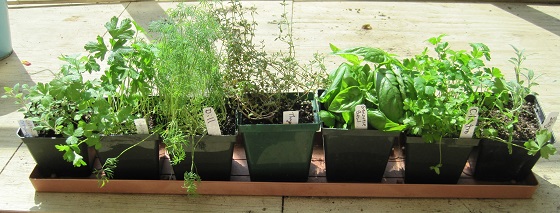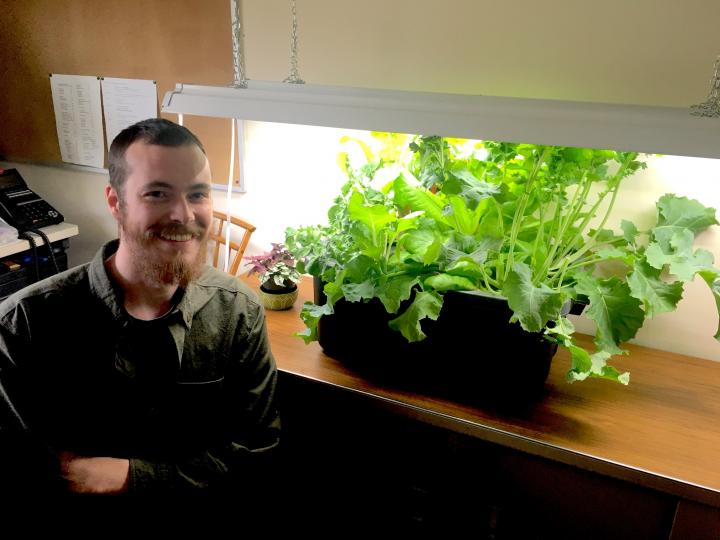Start an indoor herb garden! Even just a few pots of herbs grown on a windowsill or under grow lights can supply wonderful flavors at your fingertips year-round. Just be sure to select the right herbs that grow indoors in winter. Here’s how to get started!
Many indoor herbs prefer the same temperatures as most people—around 65 to 70 degrees F—so it’s a cozy relationship!
We’re big fans of fresh basil, rosemary, and oregano because they add flavor to foods—and a lovely scent to the kitchen. These herbs can be grown indoors during winter and at any time of the year.
 Grow herb varieties that thrive on a sunny windowsill or under grow lights. Grow them in separate pots or groupings so you can manage their watering needs. For example, basil likes moist soil and oregano and rosemary like drier soils.
Grow herb varieties that thrive on a sunny windowsill or under grow lights. Grow them in separate pots or groupings so you can manage their watering needs. For example, basil likes moist soil and oregano and rosemary like drier soils.
Top Herbs for Growing Indoors
Not every herb grows well indoors. Forget about coriander (cilantro), dill, and other spice herbs indoors for their seeds. Parsley doesn’t do well when grown indoors from seed, but an established outdoor plant can be brought inside and grow well in pots. French tarragon and chives, in particular, benefit from a cool period, so they are not ideal candidates.
Here are the top 7 herbs for an indoor herb garden:
- Oregano is a perennial favorite, best started as a young plant or propagated by root division. If you have an established oregano plant, separate off a chunk and pot it up to bring indoors. New plants can be started from seed but may take a few months to reach a harvestable size.
- Basil is an annual, so it is best to start from seed or cuttings from an established plant as they will root in water. Small-leaved varieties like dwarf Greek basil or ‘Finissimo Verde’ are best for windowsill culture, but I still grow a pot of ‘Genovese’ and keep the size down by cutting it often.
- Thymes such as caraway, lemon, narrow-leaved French, and English garden thyme are good culinary types. They are perennials (though some may not be hardy where you live) and best started as small or new plants can be divided from the parent plant.
- Parsley is a biennial plant that goes to seed in its second season. If you pot up an existing plant, use a deep container to avoid injuring the tap root. New plants can be started from seed.
- Sage is a perennial and can be grown from a softwood cutting or by division. If you want a more decorative plant than ordinary garden sage, try a tri-colored or golden one. Their flavor is not as pronounced, but they grow better indoors.
- Rosemary is easiest to grow from small plants. This herb is a tender perennial where I live, so I have been growing it in a pot outdoors so I can bring it in when the weather cools down. If you also have an established plant outside, you can take cuttings. Rosemary can be fussy. It will need bright light, a cool location, lots of air circulation, and frequent misting, but the extra pampering is worth the effort, especially if it rewards you with its delicate blue blossoms.
- Cilantro is best started from seed, but it grows fast. Use it before it flowers for the best flavor. Keep starting new plants from seed as needed.
We have Herb Growing Guides for all seven of the herbs listed above for information on planting, growing, and harvesting.

Almanac editor, Ben, growing herbs indoors at the office under grow lights!
Starting Herbs From Seeds Vs. Small Plants
Some herbs are best to start from seed and others are easiest to grow from small plants that you pick up at a garden store! Some herbs can even be started from cuttings; basil and mint can be rooted in a glass of water.
- As discussed above, perennial herbs (such as rosemary, Greek oregano, and thyme) are easiest to grow from young plants that you buy at a garden center.
- If you are buying small plants, it’s very important to check for pests, especially aphids (sticky droppings) and spider mites (fine webs on and between the leaves).
Using Small Plants From Your Garden
- You can also use small plants dug from the garden.
- Cut back any plants that you are digging up to bring indoors. They will suffer a bit of shock and may take a while to adjust and start to regrow.
- Be sure to use a large enough pot to accommodate the rootball and remove as much of the old soil as possible to get rid of any insects or their eggs.
- Isolate them from your other houseplants for a few weeks and spray them every 3 to 7 days with a soapy water solution to kill off any hitchhiking pests.
- To encourage new growth, begin fertilizing the plants once you move them to your sunny windowsill.
Tips on Growing Herbs Indoors
Light
Remember that herbs are sun worshipers that thrive in the Mediterranean, so they need a lot of light.
- Herbs need 6 to 8 hours of bright light. South-facing windows are usually warmer and good choices for rosemary, thyme, basil, and oregano. East- and west-facing windows that get bright light are fine, but better for herbs that don’t like to get baked such as parsley, chives and chervil. Herbs don’t tolerate north-facing windows.
- Full-spectrum growlights are ideal for all herbs. Place plants within a foot of the bulbs or follow the instructions provided with your lights. Start by having the lights on for 12 to 16 hours a day for bright-light plants and adjust as necessary.
- Here in our northern climate, we do use supplementary lighting to ensure strong growth. Grow Lights work for any herb as long as the light intensity is high enough.
See more about using grow lights to start seeds indoors and choosing the right grow lights.
Soil and Food
- Be careful not to overwater herbs.
- More tropical or semi-tropical herbs (rosemary, thyme, oregano) do well with equal parts of cactus mix and regular potting soil. Let the soil dry a bit before watering.
- Other herbs grow do best in regular potting soil. Keep soil slightly moist, but never soggy.
- Fertilize once or twice a month with a liquid houseplant fertilizer.
Also, the best waya to preserve and store your herbs.


 Grow herb varieties that thrive on a sunny windowsill or under grow lights. Grow them in separate pots or groupings so you can manage their watering needs. For example, basil likes moist soil and oregano and rosemary like drier soils.
Grow herb varieties that thrive on a sunny windowsill or under grow lights. Grow them in separate pots or groupings so you can manage their watering needs. For example, basil likes moist soil and oregano and rosemary like drier soils.








